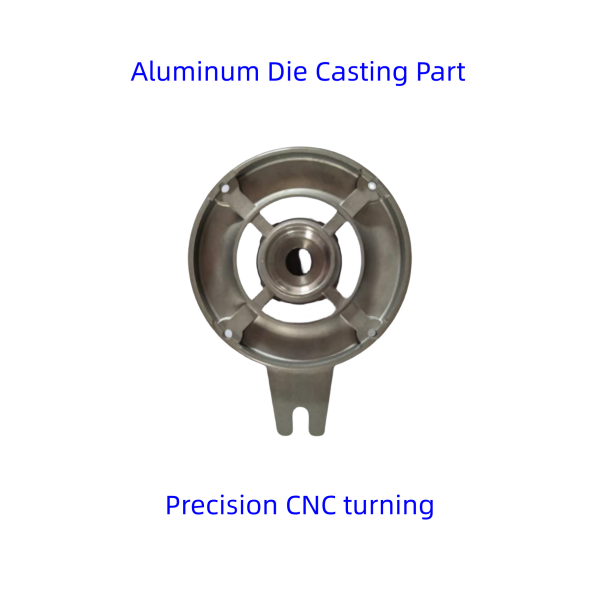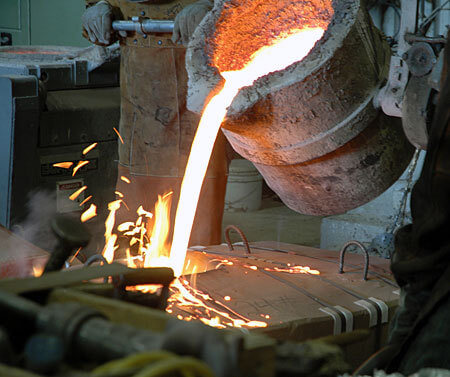Understanding aluminum casting and its uses across industries
The Future of Aluminum Foundries: Trends and Advancements Shaping the Market
The light weight aluminum shop market is undergoing considerable change. Key patterns highlight the relevance of sustainability and efficiency. Developments in smart production and automation are becoming prevalent. Foundries are significantly concentrated on utilizing recycled materials. This shift questions about future practices and innovations. Just how will these adjustments impact production approaches and market dynamics? The solutions may redefine the sector landscape in unexpected methods.
Advancements in Smart Manufacturing Technologies
As the aluminum shop sector evolves, improvements in clever production technologies are ending up being progressively necessary for enhancing efficiency and efficiency. The combination of automation, expert system, and the Internet of Points (IoT) is changing standard foundry procedures. These technologies allow real-time surveillance of procedures, permitting for prompt changes that maximize result and reduce waste.
Additionally, maker discovering formulas assess production information to recognize patterns and predict upkeep requirements, lessening downtime. Robotics are significantly employed for recurring tasks, freeing experienced workers to concentrate on even more intricate challenges. Additionally, electronic twins-- online models of physical procedures-- assist in simulations that can enhance layout and functional techniques.
The adoption of these clever production innovations is driving competitive benefits in the aluminum factory sector. By enhancing process and enhancing decision-making capacities, factories can satisfy growing market needs while maintaining high-grade requirements. The future of light weight aluminum factories is undeniably connected to these technological developments.
Accepting Eco-Friendly Materials and Processes
The aluminum factory sector is significantly concentrating on environmentally friendly products and procedures to boost sustainability. This shift consists of the adoption of sustainable material sourcing, energy-efficient manufacturing strategies, and efficient recycling and waste management approaches. By integrating these techniques, factories intend to decrease their environmental influence while keeping competition on the market.
Lasting Material Sourcing
How can aluminum foundries improve their sustainability initiatives? Lasting material sourcing has actually arised as an important strategy in achieving this objective. By focusing on recycled light weight aluminum, factories can substantially reduce their environmental footprint, as recycled materials require less energy and fewer resources compared to primary light weight aluminum manufacturing. Additionally, sourcing products from accredited vendors that adhere to green techniques advertises liable mining and reduces environmental influence. Factories are additionally checking out different materials, such as biopolymers and eco-friendly finishings, to match conventional aluminum processes. Collaborating with stakeholders, consisting of distributors and environmental companies, promotes advancement in sourcing approaches. Eventually, embracing lasting product sourcing not just lines up with global sustainability objectives but also placements light weight aluminum factories as leaders in ecologically responsible production.
Energy-Efficient Manufacturing Strategies
Aluminum shops are increasingly embracing energy-efficient production techniques to complement their lasting product sourcing campaigns. These methods concentrate on reducing power intake throughout the manufacturing procedure. Advanced innovations, such as induction melting and enhanced spreading procedures, are being carried out to decrease the general carbon footprint. Furthermore, automation and clever manufacturing systems enhance operational effectiveness, enabling much better energy administration. Shops are likewise discovering the assimilation of renewable resource resources, such as solar and wind, to power their procedures. By focusing on energy efficiency, aluminum factories not only lower manufacturing prices however likewise straighten themselves with international sustainability goals, making certain a more eco accountable strategy to aluminum manufacturing while fulfilling the increasing need for environmentally friendly practices in the industry.
Reusing and Waste Monitoring
Welcoming eco-friendly products and procedures, light weight aluminum shops are focusing on recycling and waste monitoring strategies to enhance sustainability in their operations. By integrating closed-loop systems, these facilities are decreasing waste and taking full advantage of source efficiency. Scrap light weight aluminum, an easily offered material, is being recycled on-site, significantly decreasing the requirement for virgin products and decreasing power intake. Developments in sorting and refining modern technologies even more help with the recycling of light weight aluminum, guaranteeing that even polluted products can be repurposed effectively. Furthermore, shops are adopting lasting techniques such as decreasing hazardous waste and advertising the usage of eco-friendly materials for packaging. This dedication to recycling not just lowers environmental influence but likewise boosts the economic practicality of aluminum foundries in a competitive market.
The Duty of Automation and Robotics
Automation and robotics are significantly changing the aluminum factory sector, considerably improving production effectiveness. By integrating advanced technologies, factories can lower labor costs while all at once enhancing safety and security requirements for their labor force. This change not just simplifies procedures yet additionally positions the sector for sustainable development in an affordable market.
Boosted Production Performance
Changing manufacturing procedures, the integration of innovative robotics and automation innovations has come to be a keystone for aluminum foundries looking for boosted effectiveness. These developments streamline process, minimize cycle times, and improve product quality by decreasing human mistake. Automated systems can keep track of production lines in real-time, enabling prompt changes that enhance result. On top of that, robotics help with the handling of hazardous materials, making certain safer workplace while raising throughput. Predictive maintenance technologies additionally add to efficiency by preparing for tools failures, thereby minimizing downtime. As a result, light weight aluminum shops can attain better consistency in their items while reacting extra promptly to market demands. This accept of automation is establishing a new criterion for efficiency and operational quality within the market.

Lowering Labor Costs
The shift towards advanced robotics and automation in light weight aluminum shops not just improves production performance but likewise plays a substantial duty in lowering labor prices. By incorporating automated systems, factories can reduce the reliance on manual work, which often includes high salaries and training expenses. Robotics simplify repetitive jobs such as pouring, molding, and finishing, enabling a higher output with less employees. This technological adjustment not just lowers labor-related costs yet likewise boosts uniformity and high quality in production. Automation can operate around the clock, making best use of functional hours without the linked expenses of overtime or change differentials. Consequently, aluminum foundries can accomplish significant cost savings while maintaining competitive pricing in an evolving market landscape.
Improving Safety Standards
While standard light weight aluminum shop procedures often subject workers to harmful atmospheres, the combination of robotics and automation considerably enhances security requirements within the industry. Automated systems can perform high-risk jobs, such as liquified steel handling and heavy training, reducing human direct exposure to hazardous conditions. In addition, robotics can operate in extreme temperature levels and poisonous environments, properly reducing the risk of injury. Advanced keeping an eye on modern technologies and great post to read expert system guarantee real-time safety and security assessments, permitting go to my site immediate responses to potential risks. Automation improves operations, lowering the possibility of accidents caused by human mistake. Therefore, the fostering of these technologies not only improves safety but likewise promotes an extra effective and effective functioning environment in light weight aluminum factories.
Enhancing Energy Effectiveness in Manufacturing
As light weight aluminum foundries look for to keep competitiveness in a developing market, enhancing energy efficiency in production has actually emerged as a crucial emphasis. By taking on advanced innovations such as high-efficiency melting heaters and automated temperature level controls, shops can especially lower energy intake. Carrying out real-time surveillance systems enables precise monitoring of energy use throughout the production process, making it possible for quick adjustments to optimize effectiveness.
Additionally, shifting to different energy sources, consisting of eco-friendly alternatives, can further decrease the carbon impact. The integration of energy healing systems, which recover waste heat for reuse, is ending up being increasingly typical. Training employees in power administration practices ensures that everyone associated with the manufacturing procedure is conscious of energy use.
These efforts not just lower operational prices yet additionally line up with international sustainability goals, placing aluminum factories as responsible players in the industry while enhancing their total competitiveness. - aluminum casting
Developments in Recycling Light Weight Aluminum
Developments in recycling light weight aluminum have obtained energy together with efforts to boost energy effectiveness in manufacturing. The aluminum industry has welcomed advanced modern technologies that improve the recycling procedure, minimizing power usage and environmental influence. Techniques such as hydrometallurgy and brand-new sorting modern technologies boost the removal of aluminum from scrap, improving yield prices and ensuring better recycled material.
Additionally, the development of closed-loop recycling systems allows foundries to recycle light weight aluminum without significant destruction in top quality, making the process more lasting. Innovations in logistics and collection, consisting of boosted radar and automated sorting, have additionally played an essential duty in raising the performance of aluminum healing. These improvements not just contribute to a round economic situation yet additionally assist alleviate the carbon impact connected with light weight aluminum production. As the need for lasting techniques expands, these technologies position the aluminum foundry sector as a leader in accountable source management.
Replying To Market Needs and Consumer Trends
Versatility has come to be a foundation for aluminum foundries replying to developing market needs and customer patterns. As sectors significantly prioritize sustainability, light weight aluminum factories are shifting in the direction of environmentally friendly practices, consisting of improved recycling processes and decreased carbon footprints. This change aligns with consumer choices for ecologically responsible items, driving shops to innovate their offerings.
Additionally, the increase of light-weight products in automobile and aerospace industries requires innovations in light weight aluminum alloys and casting techniques. Factories are buying r & d to generate high-strength, light-weight parts that meet rigid performance standards.
Modification has gotten traction, with consumers looking for customized remedies. Light weight aluminum shops are leveraging sophisticated production modern technologies, such as 3D printing, to accommodate particular customer demands efficiently. This responsiveness not visit the site just satisfies consumer demands yet likewise placements light weight aluminum shops competitively in a dynamic market landscape, ensuring their significance in an ever-changing industrial atmosphere.

Often Asked Questions
Exactly How Do Light Weight Aluminum Foundries Influence Resident Economies?
Light weight aluminum factories substantially affect regional economic climates by developing work, promoting need for neighborhood vendors, and adding to area development. Their operations frequently result in enhanced tax obligation profits, which can money vital civil services and infrastructure enhancements.
What Are the Safety Rules for Light Weight Aluminum Foundry Employees?
Security regulations for aluminum shop employees consist of necessary personal protective equipment, correct ventilation systems, routine training on harmful materials, and adherence to guidelines set by work health and wellness managements to minimize threats and guarantee worker security. - aluminum casting
Just How Does Aluminum Recycling Affect Global Supply Chains?
Light weight aluminum reusing substantially reduces demand for resources, boosts source effectiveness, and supports costs. This shift effects worldwide supply chains by promoting a circular economic climate, promoting sustainability, and making certain an extra resilient industry in fluctuating markets.
What Job Opportunities Exist in the Light Weight Aluminum Shop Market?
Various profession chances exist in the light weight aluminum factory market, including roles in design, quality assurance, manufacturing management, and r & d. Proficient labor settings such as mold and mildew manufacturers and equipment operators are also in demand.
Just How Do International Trade Plans Influence Light Weight Aluminum Foundries?
International trade plans greatly impact light weight aluminum shops by influencing import tolls, supply chain characteristics, and market gain access to. These variables can influence operational prices, competitiveness, and overall earnings within the worldwide aluminum production landscape.
By prioritizing recycled aluminum, shops can substantially decrease their ecological footprint, as recycled materials call for less power and less sources contrasted to primary light weight aluminum manufacturing. Light weight aluminum shops are progressively adopting energy-efficient manufacturing methods to enhance their lasting product sourcing efforts. Automation and robotics are progressively transforming the aluminum factory market, considerably improving production performance. The change in the direction of advanced robotics and automation in aluminum foundries not only improves manufacturing effectiveness however likewise plays a significant duty in reducing labor prices. As aluminum foundries seek to preserve competition in a progressing market, improving power performance in production has arised as a crucial emphasis.